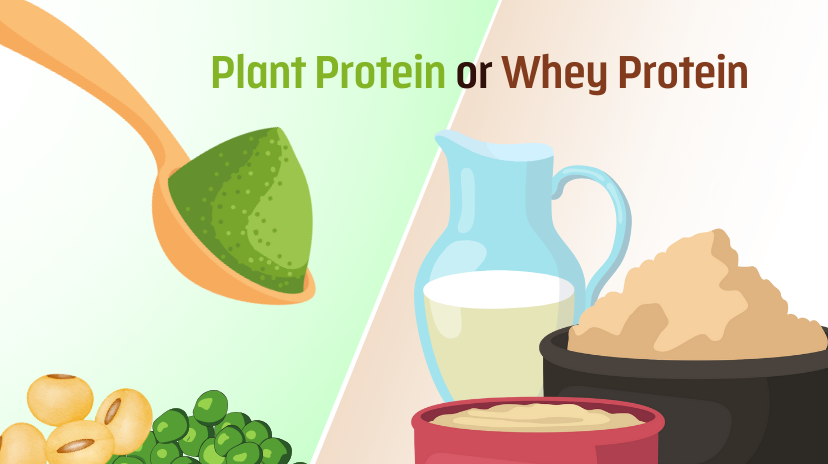
Whey Protein vs. Plant Protein: Which Protein Is Best For You
Share
When it comes to choosing a protein supplement, two popular options often come up: whey protein and plant protein. Each has its own set of benefits and potential drawbacks, and understanding these can help you make an informed decision based on your dietary needs and fitness goals. In this comprehensive guide, we’ll clear up common misconceptions and explore both types of protein in detail.
What is Whey Protein?
Whey protein is derived from milk during the cheese-making process. It's a complete protein, meaning it contains all nine essential amino acids required by the body. Known for its quick absorption and effectiveness in muscle repair and growth, whey protein is a favorite among athletes and fitness enthusiasts.
Benefits of Whey Protein:
- High Biological Value: Whey protein has a high biological value (BV), which means it’s efficiently used by the body.
- Supports Muscle Growth: Rich in leucine, an amino acid crucial for muscle protein synthesis.
- Immune System Boost: Contains immunoglobulins and lactoferrin that support immune health.
- Convenience: Fast digestion and absorption make it ideal for post-workout recovery.
Drawbacks of Whey Protein:
- Lactose Intolerance: Individuals with lactose intolerance might experience digestive discomfort.
- Not Vegan-Friendly: As a dairy product, it’s not suitable for vegans or those with a dairy allergy.
What is Plant Protein?
Plant protein, sourced from various plants like peas, rice, hemp, and soy, offers a great alternative to animal-based proteins. Unlike whey, plant protein may not always contain all essential amino acids, but it’s suitable for vegans and those with dairy sensitivities.
Benefits of Plant Protein:
- Digestive Health: Typically easier on the digestive system and may aid in gut health.
- Rich in Fiber: Many plant proteins come with added fiber, which supports digestive health.
- Environmental Impact: Generally, plant-based proteins have a lower environmental footprint compared to animal-based proteins.
- Vegan-Friendly: Ideal for those following a vegan or vegetarian diet.
Drawbacks of Plant Protein:
- Incomplete Proteins: Some plant proteins are not complete, meaning they may lack one or more essential amino acids. Combining different plant sources can help overcome this.
- Slower Digestion: Plant proteins might be digested more slowly compared to whey protein.
Whey Protein vs. Plant Protein: Key Differences
- Amino Acid Profile: Whey protein is a complete protein with a rich amino acid profile, while some plant proteins may require combination with other plant sources to achieve a complete profile.
- Digestibility: Whey protein is quickly absorbed and utilized by the body, which is beneficial for post-workout recovery. Plant proteins may have a slower digestion rate but are often gentler on the stomach.
- Allergen Considerations: Whey protein contains lactose, which can be problematic for those with lactose intolerance. Plant proteins are typically free from common allergens, making them suitable for a wider range of people.
- Environmental Impact: Plant proteins generally have a smaller environmental footprint, which is a consideration for environmentally conscious consumers.
Misconceptions About Whey and Plant Proteins
Myth 1: Whey Protein Is Superior to Plant Protein
- Fact: While whey protein is highly effective for muscle growth, plant proteins can also support muscle repair and offer additional health benefits like fiber and antioxidants.
Myth 2: Plant Proteins Are Inferior
- Fact: Plant proteins can be just as effective when consumed in appropriate combinations and quantities. They also provide unique health benefits not found in animal proteins.
Myth 3: All Plant Proteins Are Incomplete
- Fact: Some plant proteins, like soy and quinoa, are complete proteins. Others may require combining with different plant sources to provide all essential amino acids.
Conclusion
Both whey protein and plant protein have their unique advantages and potential drawbacks. Whey protein is highly effective for muscle growth and recovery but may not be suitable for those with dairy intolerances. Plant protein offers a versatile, vegan-friendly alternative with benefits for digestive health and environmental sustainability.
Ultimately, the best choice depends on your individual dietary needs, fitness goals, and lifestyle preferences. Whether you choose whey or plant protein, ensure that it fits well into your overall nutrition strategy.
Further Reading
For a deeper dive into the research and benefits of both whey and plant proteins, consider exploring these resources:
- Whey Protein: Benefits and Risks
- Plant Protein: Health Benefits and Nutritional Profile
- Comparative Analysis of Whey and Plant Proteins
By understanding the facts, you can make a well-informed decision that supports your health and fitness journey.
